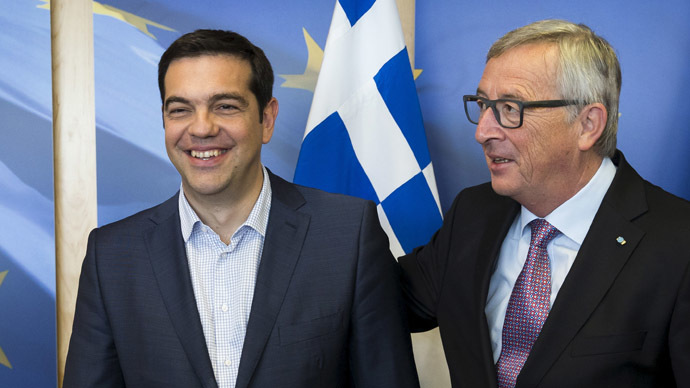‘Greece trying to negotiate from position of both weakness and strength’

Athens still has cards up its sleeve and some surprising ones are likely to be played in its negotiations with the EU before the debt deadline, John Butler, Chief Investment Officer at Amphora Capital, told RT.
RT:The latest reform proposals put forward by Greece have been rejected by international creditors. But this time there is one thing that differs with the latest reform plan - defense budget cuts. Why do you think Athens included military spending this time?
John Butler: I think they are trying to strengthen their negotiating position to some extent. They are trying to show “Hey, we are operating in good faith here, we are negotiating in good faith, if we are serious about trying to come to terms and reach an agreement, let’s go ahead and put everything on the table,” and so they are offering now defense cuts alongside of course the laundry list of other demands that have already been made by the EU negotiating partners.
RT:The biggest arms supplier to Greece and its main creditor is in fact the same country - Germany. Is there any link to the decision to cut the defense budget now?
READ MORE: Greece rejects ‘exceptionally generous’ counterproposals by creditors
JB: Let’s try to put that in perspective. There are multiple possible explanations for why the defense budget is now being placed on the table by Greece. The first is that they are trying to say “Look, if we are all serious about coming to an agreement, we have to accept the fact that some of the terms may not be beneficial for Germany or France or other countries, but we are all in this together,” perhaps to some extent it is the signal there. The other one is – let’s just face it, the defense budget as a proportion of the overall budget is very small relative to pensions and other forms of welfare. So it was never perhaps a priority in the first place for that reason that it’s disproportionally smaller. The third reason now is also one that needs to be considered. Greece and other European members of NATO have been under pressure for years by the US to increase defense spending. US defense spending is much larger and also the UK has put pressure on other European countries to step up to the plate and to spend a bit more on defense so the defense spent across NATO is more equivalent. So that’s another possible reason why Greece’s held back up to this point from suggesting that they should in fact cut the defense budget when there has been pressure coming from the US to increase the defense budget.
RT:The June 30th deadline is neither the first nor the last for Greece. Are we going to witness the same hysteria every month till the debt is paid off in full?
JB: It’s very difficult to know what’s actually going on here in part because when you get into a negotiation of this kind naturally the parties involved are not forthcoming regarding their true interests, regarding what they are trying to achieve, trying to avoid. That uncertainty helps to strengthen your negotiating position and now we are so far into real brinksmanship. It’s extremely difficult to know. That said, we do believe - or I would think that we can honestly and confidently believe - that Greece is really trying here to negotiate from a position of both weakness but also strength. They do have some cards up their sleeve; some of them have to do with more than just immediate debt issues at hand, but their broader relationship with the euro, with the EU and geopolitical issues. I think what we are going to see as we come to the final hours of negotiations here are surprises. I really think we will see some surprises. This is not going to be straight forward and it may not reach a satisfactory resolution, it simply may not. There may be intractable differences, but some surprising cards are likely to be played perhaps on both sides before this is over.
LISTEN MORE:
The statements, views and opinions expressed in this column are solely those of the author and do not necessarily represent those of RT.
The statements, views and opinions expressed in this column are solely those of the author and do not necessarily represent those of RT.












